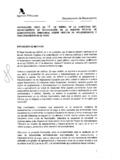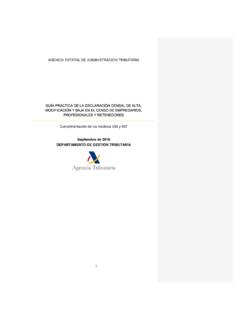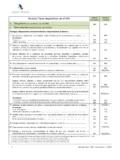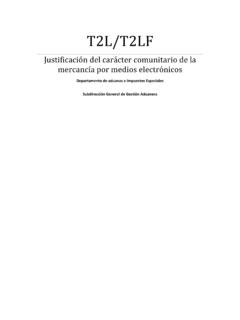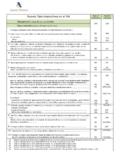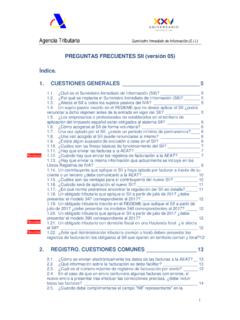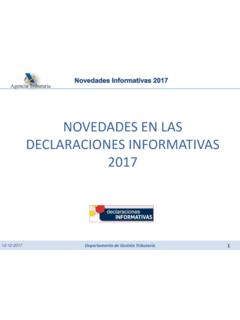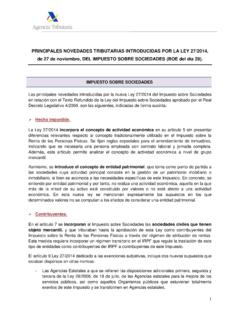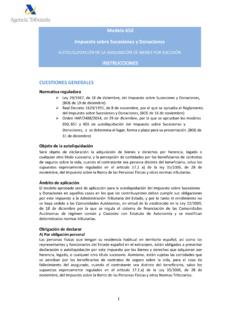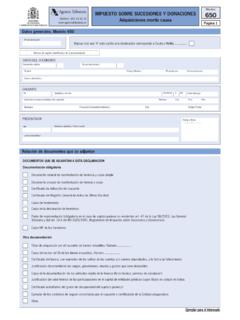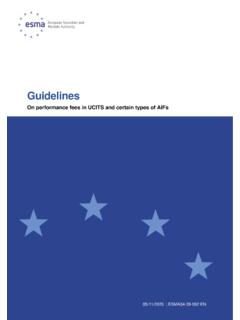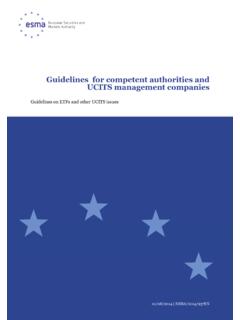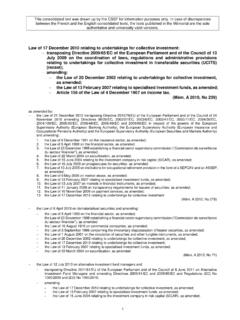Transcription of Non-resident Income Tax Instructions for filling in Non ...
1 Non-resident Income Tax Form Instructions for filling in 210 your self-assessment form Non-residents without permanent establishment Important: All amounts required must be expressed in euros, placing the whole number in the left hand division of the corresponding boxes, and fractions (to two decimal points) on the right. Any mention in these Instructions to the Tax Act and the Regulations refer to the consolidated text of the Non-resident Income Tax Act, passed by Legislative Royal Decree 5/2004 (Official State Gazette of 12 March) and the Regulations for application of this Tax, passed by the single article of Royal Decree 1776/2004 dated 30 July (Official State Gazette of 5 August). Obligation to declare This self-assessment form should be used to file returns on Income obtained without permanent establishment by taxpayers subject to Non-resident Income tax. They shall not be required to file a self-assessed tax return regarding the Income which the withholding referred to in article 31 of the Tax Law was applied to or the on-account payment made, with the exception of capital gains derived from the reimbursement of shares in investment funds regulated in Law 35/2003, dated 4 November, on collective trust institutions when the applied withholding has resulted less than the calculated tax liability in accordance with the provisions in Articles 24 and 25 of the Tax Law.
2 They shall also not be obligated to file a self-assessed tax return regarding Income subject to withholding or on-account payment but exempt on account of Article 14 of the Tax Law or in an applicable agreement. In particular, there is still the obligation to declare in the following cases of receiving Income : - Income subject to Non-resident Income Tax but exempt from tax withholding and payment on account, in accordance with article of the Tax Regulations. These include, for example, capital gains derived from the sale of shares. - Natural persons. Income from urban buildings. - Payments made by natural persons who are not withholders. For example, earnings obtained from property lets when the tenant is a natural person and pays the rent for purposes other than an economic activity. - For Income from conveyance of property located in Spanish territory, Non-resident taxpayers must file and pay, as applicable, the definitive tax, and make the appropriate adjustment to the tax amount based on the amount withheld or paid on account by the purchaser, as described in article of the Tax Law.
3 - To request a refund for excess withholdings or payments on a account related to the tax levied. These taxpayers are taxed separately for each total or partial taxable Income accrued. Therefore, when bound to file a tax return, they must use this self-assessment form to declare each Income separately. In this way, they can declare any type of Income (earnings, Income from real estate, capital gains). Nevertheless, this self-assessment form can be used to declare several different incomes obtained by a single taxpayer as a group, provided they have the same Income type code, come from the same payer, and are subject to the same tax rate. Furthermore, if these incomes derive from an asset or right, they must come from the same asset or right. Nevertheless, in the case of Income from rented or sublet property not subject to withholdings, they may be grouped with the same requirements except the requirement related to Income from a single payer, although when Income from property is declared from various payers a specific Income type code must be indicated, code 35.
4 Concerning Income from the transfer of real estate assets: - In the event of a loss, taxpayers must also file this self-assessment form if they wish to exercise their right to receive a refund on withholdings already paid. - If the real estate asset in question is jointly owned by a married couple in which both spouses are non-residents, a single tax return may be filed. Request for refund due to application of an agreement related to the special tax on certain gambling and lottery winnings: Nonresident taxpayers without a permanent establishment who have obtained prizes subject to the special tax on certain gambling and lottery winnings established by the Fifth of the Tax Law when amounts were deposited in the Treasury or withholdings were paid on account of this special tax, in amounts greater than those derived from the application of an agreement to prevent double taxation, may request this application and the subsequent refund with self-assessment form 210, section 210 G, writing code 31 in box (2) "Type of Income ", and on the form, place, deadlines and with the documentation established for this self-assessed tax return.
5 If, due to application of an agreement, taxes are paid on the prizes exclusively in the country of residence, write "Agreement" in the Exemptions box (20) and write zero in box (2) "Type of tax IRNR Law". Supplementary taxation: Regarding supplementary taxation applicable to permanent establishments referred to in Article of the Tax Law, for their declaration and payment, use form 210, section 210 R, writing code 27 in box (2) "Type of Income ". This supplementary taxation will not be applicable to those permanent establishments whose head office has its tax residence in 1. another Member State of the European Union (Appendix VI), except in the case of a country or territory considered as a tax haven, or in a State that has signed an Agreement for avoiding double taxation with Spain, in which no other situation is expressly established, provided that there exists reciprocal treatment.
6 Filing method The filing can be done: online, with an electronic signature certificate recognised by the Tax Agency, or on paper, generated by printing the form after it has been completed in on Tax Agency's the Internet portal. Documentation The following documentation must be submitted: - Residence certificates or forms: When the self-assessment form filed applies exemptions provided for under Spanish law due to the the taxpayer's residence status, it must be accompanied by a residence certificate issued by the tax authorities of their country of residence, justifying this exemption. However, when the entities referred to in Additional Provision 3, Section 1 of the Non-resident Income Tax Regulations (Pension Funds and Unit Trust Institution resident in the European Union) apply the exemption specified in Article ) of the consolidated text of the Non-resident Income Tax Act (on interest and capital gains from movable assets), residence may be accredited as specified in the same additional provision (in some cases, by certificates issued by the supervising authorities or register in the State of residence, and in others, by statements by representatives of the affected entities).
7 Also, when applying the exemptions established under article ) and ) of the consolidated text of the Non- Resident Income Tax Act, passed by Legislative Royal Decree 5/2004 of 5 March, pension funds or unit trust institutions subject to a specific supervisory system or administrative register, instead of justifying exemption by means of a certificate of residence the following documentation must be submitted: a) In the case of exemption under article ), it is necessary to submit a statement signed by the representative of the pension fund stating their compliance with legal requirements, conforming to the form included under appendix VI of this Order. However, social welfare institutions governed by directive (EU) 2016/2341 of the European Parliament and of the Council of 14 December 2016 on the activities and supervision of institutions for occupational retirement provision may attach a certificate issued by the competent authority of the State in which the institution is established, under the same terms and for the same indefinite duration as specified in Additional Provision 3, Section ), Paragraph 2 of the Non- Resident Income Tax Regulation.
8 B) In the case of exemption under article ), it is necessary to submit a certificate issued by the competent authority of the Member State where the institution is based, stating that said institution complies with the requirements established in directive 2009 /65/EC of the European Parliament and the Council, of 13 July 2009 , on the coordination of laws, regulations and administrative provisions relating to undertakings for collective investment in transferable securities (UCITS). The relevant authority will be that designated as per article 97 of the above directive . When the self-assessment form is filed applying exemptions or reductions to the taxable amount due to tax limits established in a double taxation agreement signed by Spain, it is necessary to submit a certificate of residence for tax purposes issued by the corresponding tax authority justifying this entitlement.
9 Said certificate must expressly state that the taxpayer is a resident within the meaning of the Agreement. However, when the self-assessment form is filed applying a tax limit established in an Agreement implemented by an Order that establishes the use of a specific form, this must be submitted instead of the aforementioned certificate. When, pursuant to article of the Tax Act, expenses are deducted for the purpose of establishing the taxable base due to the taxpayer being resident in another European Union Member State, or of the European Economic Area with operative exchange of tax information, it will be ncessary to submit a certificate of residence for tax purposes in the corresponding State issued by the tax authority of said State. Residence certificates and statements according to the forms in Annexes VI and VII of the Order approving this form will be valid for one year after the date of issue.
10 Nevertheless, residence certificates will have unlimited validity when the taxpayer is a foreign state, any political or administrative subdivision or corresponding local organisations of the same. The certificate issued by the competent authority of the Member State of origin of the Unit Trust Institution, referred to under b) as previously cited in the same section, and the certificates issued by the competent authorities specified in Additional Provision 3 of the Non-resident Income Tax Regulation, will also be of indefinite duration, as long as there are no changes to the data they contain. However, in the case of self-assessed tax returns filed by jointly responsible parties who act as trustees of securities, it will be sufficient for said trustees to keep on their files the residence certificates, the statements and the forms referred to above during the tax period of limitation, making the same available for inspection by the Spanish tax authorities.
